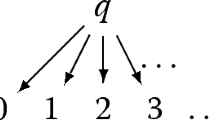Abstract
This paper considers games in normal form played by Turing Machines. The machines are fed as input all the relevent information and then are required to play the game. Some ‘impossibility’ results are derived for this set-up. In particular, it is shown that no Turing Machine exists which will always play the correct strategy given its opponent's choice. Such a result also generalizes to the case in which attention is restricted to economically optimizing machines only. The paper also develops a model of knowledge. This allows the main results of the paper to be interpreted as stemming out of the impossibility of always deciding whether a player is rational or not in some appropriate sense.
Similar content being viewed by others
References
Anderlini, L.: 1988, ‘Forecasting Errors and Bounded Rationality: An Example’, Economic Theory Discussion Paper No. 127, University of Cambridge, Cambridge.
Aumann, R.: 1981, ‘Survey of Repeated Games’. In Essays in Game Theory and Mathematical Economics in Honor of Oskar Morgenstern. Mannheim-Wien-Zurich: Bibliographisches Institut.
Binmore, K.: 1987a, ‘Modeling Rational Players’, Economics and Philosophy 3, 179–214.
Binmore, K.: 1987b, ‘Remodeled Rational Players’, S.T.I.C.E.R.D. discussion paper 87/149, London School of Economics, London.
Brainerd, W. S. and Landweber, Q.: 1974, Theory of Computation, John Wiley & Sons, New York.
Brandenburger, A.: 1989, ‘The Role of Common Knowledge Assumptions in Game Theory’. In The Economics of Missing Markets, Information and Games, F. H. Hahn (Ed.). Oxford University Press.
Canning, D.: 1988, ‘Rationality and Game Theory When Players Are Turing Machines’. S.T.I.C.E.R.D. discussion paper 88/183, London School of Economics, London.
Cutland, N. J.: 1980, Computability. Cambridge University Press, Cambridge.
Davis, M.: 1958, Computability and Unsolvability. Dover Publications, New York.
Fagin R. and Halpern, J. Y.: 1985, ‘Belief, Awareness and Limited Reasoning: Preliminary Report’. Proceedings of the 9th International Joint Conference on Artificial Intelligence, Los Angeles.
Halpern, J. Y.: 1986, ‘Reasoning About Knowledge: An Overview’, in Theoretical Aspects of Reasoning about Knowledge, J. Halpern (Ed.). Morgan Kaufmann Publishers, Los Altos, California.
Halpern, J. Y. and Moses, Y.: 1985, ‘A Guide to the Model Logics of Knowledge and Belief: Preliminary Draft’. Proceedings of the 9th Joint Conference on Artificial Intelligence, Los Angeles.
Howard, J. V: 1988, ‘Cooperation in the Prisoner's Dilemma’, Theory and Decision 24, 203–213.
Konolige, K.: 1986, ‘What Awareness Isn't: A Sentential View of Implicit and Explicit Belief’, in Theoretical Aspects of Reasoning About Knowledge, J. Y. Halpern (Ed.). Morgan Kaufmann Publishers, Los Altos, California.
Kripke, S.: 1963, ‘Semantical Analysis of Modal Logic’, Zeitschrift für mathematische Logik und Grundlagen der Mathematik 9, 67–96.
McAfee, R. P.: 1984, Effective Computability in Economic Decisions, University of Western Ontario, mimeo.
Neyman, A.: 1985, ‘Bounded Complexity Justifies Co-operation in the Finitely Repeated Prisoners' Dilemma’, Economics Letters 19, 227–229.
Rogers, H. R.: 1967, Theory of Recursive Functions and Effective Computability, McGraw-Hill, London.
Rubinstein, A.: 1986, ‘Finite Automata Play the Repeated Prisoner's Dilemma’, Journal of Economic Theory 38, 83–96.
Soare, R. I.: 1987, Recursively Enumerable Sets and Degrees: A Study of Computable Functions and Computably Generated Sets, Springer-Verlag, New York.
Author information
Authors and Affiliations
Rights and permissions
About this article
Cite this article
Anderlini, L. Some notes on Church's thesis and the theory of games. Theor Decis 29, 19–52 (1990). https://doi.org/10.1007/BF00134103
Issue Date:
DOI: https://doi.org/10.1007/BF00134103




